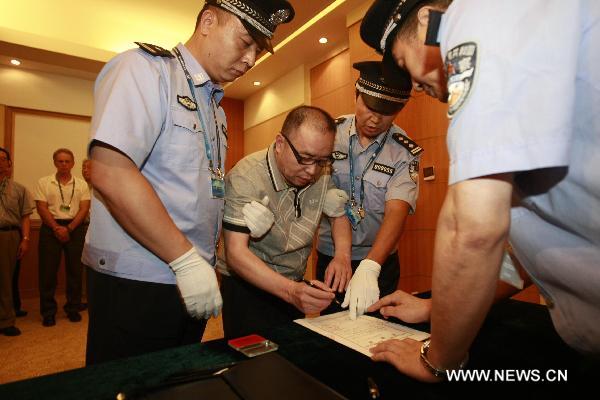Preventing criminals fleeing overseas
- By Yang Tao
 0 Comment(s)
0 Comment(s) Print
Print E-mail
China.org.cn, July 31, 2011
E-mail
China.org.cn, July 31, 2011
Lai Changxing returned to China last Saturday after spending the last 12 years on the run in Canada.
Often described as "China's most wanted fugitive," Lai was wanted for his involvement in one of the largest corruption cases in modern Chinese history that involved complex smuggling schemes.
Lai's repatriation shows China's resolution to honor the dignity of law and to severely punish serious economic crimes.
 |
| Alleged smuggling kingpin Lai Changxing (C) signs a warrant issued for his arrest as he arrives at the Beijing Capital International Airport in Beijing, capital of China, July 23, 2011. Lai, who is China's most-wanted smuggler, was repatriated back to China on Saturday after 12 years on the run, according to the Ministry of Public Security. Lai is accused of running a multibillion-dollar smuggling ring based in Xiamen, southeast China's Fujiang Province in the 1990s. [Xinhua] |
But a great deal of time and resources were used to bring back Lai. Necessary lessons should be drawn.
Beyond all doubt Lai could have been sent back into Chinese custody without delay if China had signed an extradition treaty with Canada. China has signed extradition treaties with more than 30 countries, though they are mostly neighboring ones that are hardly meccas for fugitives. But Canada was not one of them. If it had been, the cost of manpower and material resources to bring back Lai would have been reduced. Thus, his repatriation shows the urgency of signing extradition treaties with more countries.
Whether signing an extradition treaty or other international judicial treaty to quicken the process of repatriation, China's legal system should be in line with international standards.
An important reason for Lai's extradition is the compromise China made by promising not to sentence him to death. According to international practice, convicts on death row cannot be extradited. But China uses capital punishment for a range of crimes, especially economic crimes. That puts obstacles in the way of signing extradition treaties with other countries.
To gradually restrict or even end capital punishment for economic crime needs careful consideration. More importantly, China should enhance mutual judicial trust with other countries. Great progress has been made in China's judicial system, and it should be displayed and publicized more transparently.
China still needs to speed up development of its legal system and eliminate problems, such as illegal procedures and treating suspects harshly, to win the full trust of other countries.
Whether extradition or repatriation, the cost is high. The organization and discipline inspection departments should establish ways to prevent criminals or corrupt officials from fleeing overseas, which will eliminate the need for help from other countries.
(This post was first published in Chinese and translated by Wang Yanfang.)
Opinion articles reflect the views of their authors, not necessarily those of China.org.cn






Go to Forum >>0 Comment(s)